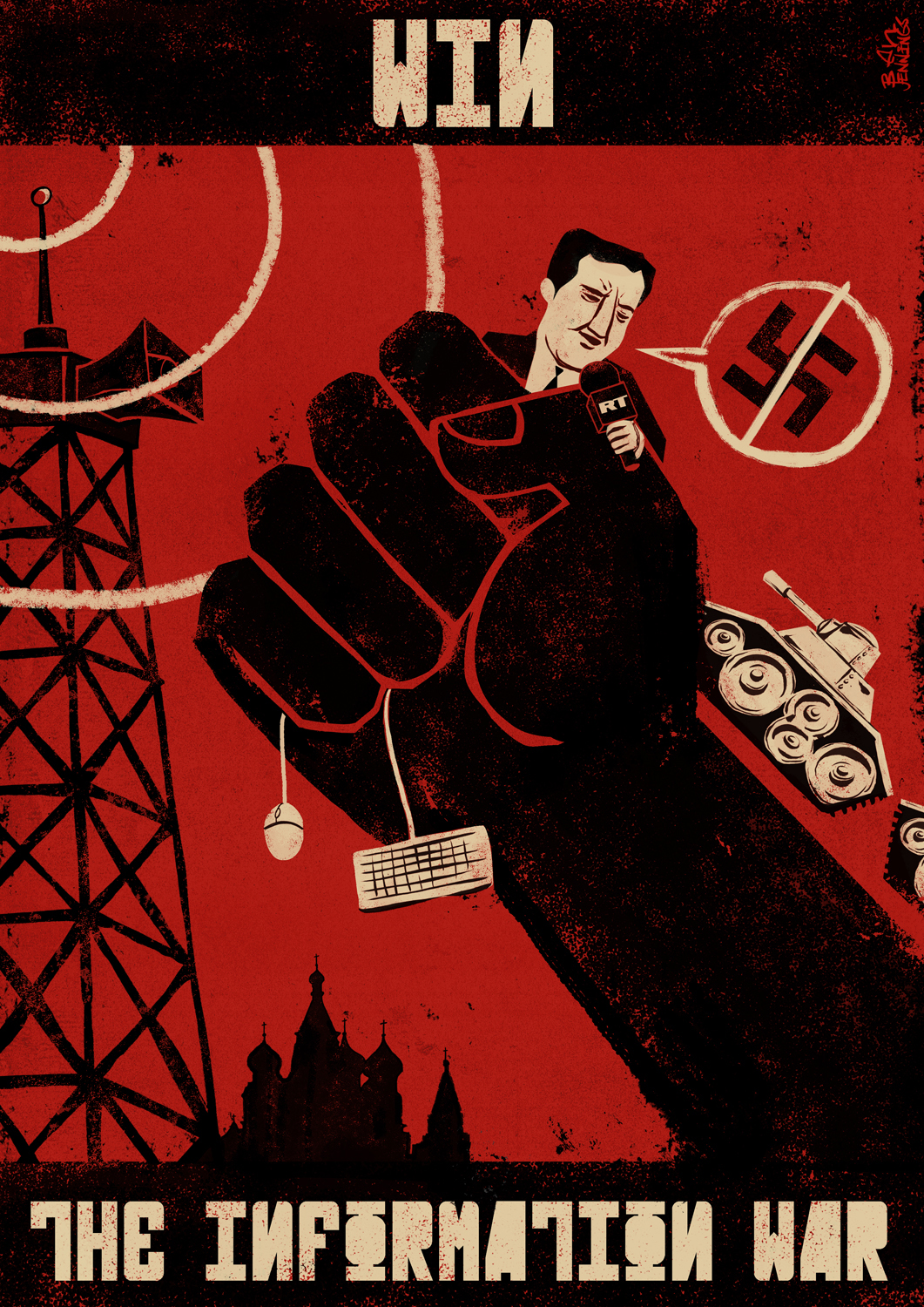22 May 2014 | Europe and Central Asia, News, Politics and Society, Ukraine
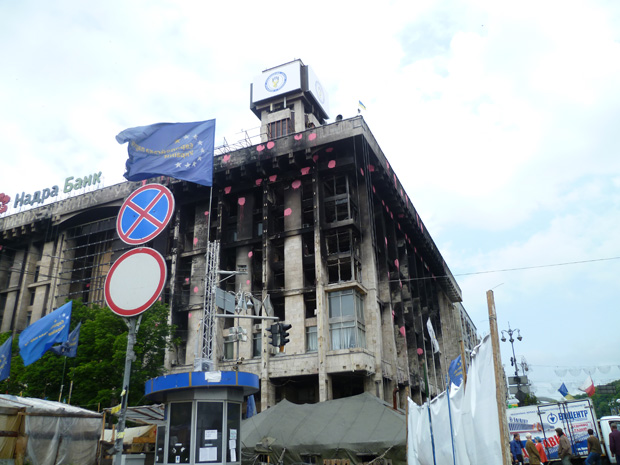
(Photo: Milana Knezevic/Index on Censorship)
Walking around Kiev’s Maidan Nezalezhnosti square, months after the protest that enveloped the city and toppled the corrupt government of Viktor Yanukovych died down, is a strange experience. International attention has understandably shifted, the images now beamed across the world are from the ongoing crisis in eastern Ukraine. The capital is calm these days, so I don’t know exactly what I was expecting as I made my way down Mykhailivska street.
Tents still populate Maidan, with young and old lounging, talking and cooking in the May sunlight. I walked past sandbag barricades, and ones made of tyres painted in the blue and yellow of the Ukrainian flag. There were flags were everywhere — EU, American, British, and many more. I walked past the independence monument, juxtaposed against the new year tree, covered by protesters in posters, and yet more flags. Music was blaring out from the small stage facing these towering structures. The lyrics I couldn’t understand, apart from the cry of “Ukraina” in the chorus. I made my way past the Maidan press centre, towards a bridge which had a large banner emblazoned with names and faces hanging from it. The Hotel Ukraina behind me, I looked out over the square.
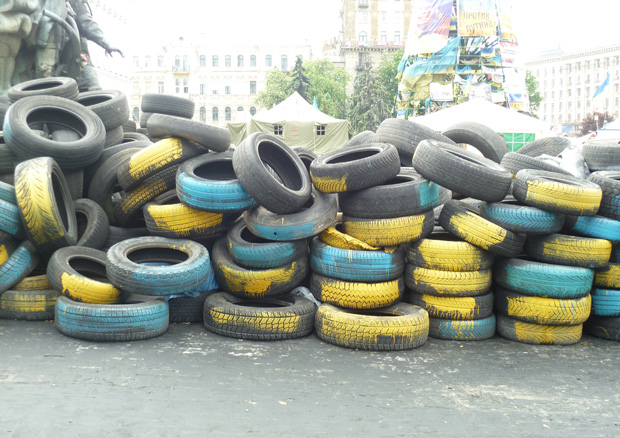
(Photo: Milana Knezevic/Index on Censorship)
The only thing missing was the crowds. It felt like they had just taken a break — gone for lunch, to return at any moment. Perhaps I arrived with a naive “out of sight, out of mind”, mentality, subconsciously assuming that the square would to an extent have been cleared out. But Maidan seems to be, for now at least, a living monument to the profound change, and crisis, Ukraine is going through.
It was against this backdrop, and with the country’s general elections set for this Sunday, I travelled to Kiev to take part in the conference Ukraine: Thinking Together. The brainchild of Yale University history professor Timothy Snyder and the New Republic’s Leon Wieseltier, its purpose was “to meet Ukrainian counterparts, demonstrate solidarity, and carry out a public discussion about the meaning of Ukrainian pluralism for the future of Europe, Russia, and the world.” The guest list included academics like Bernard-Henri, Lévy Timothy Garton Ash and Ivan Krastev, and journalists like The New York Times’ Roger Cohen and The Atlantic’s David Frum. Former Swedish prime minister Carl Bildt also made an appearance at the welcome reception.
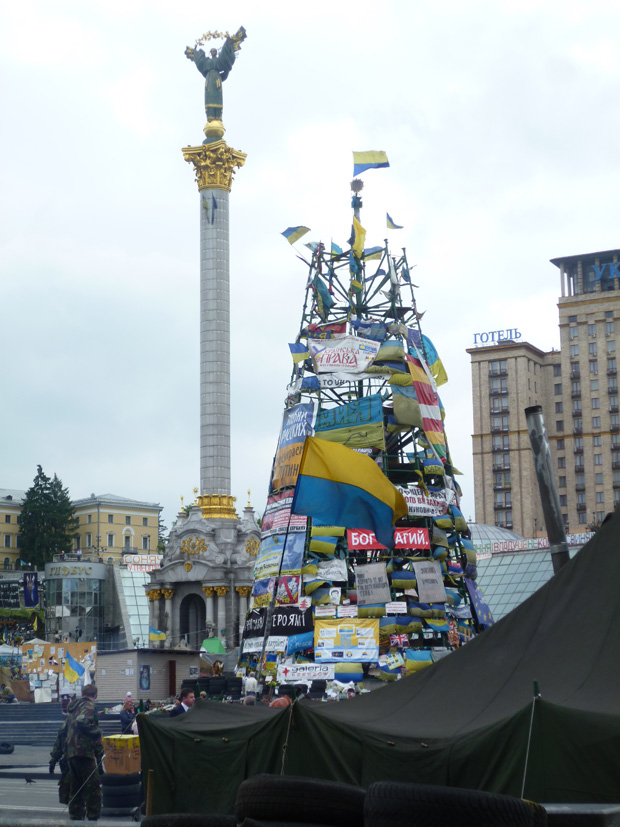
(Photo: Milana Knezevic/Index on Censorship)
One could question what, if any, effect the discussions of a group of intellectuals might have on the very real crisis on the ground. Over the weekend, there were among other things, a Crimean Tartar journalist was detained in Simferopol, while the Ukrainian military arrested two Russian reporters. But Kiev-based journalist Maxim Eristavi told me, and tweeted, that it was “surreal” to have the “intellectual powerhouse of the West in one room in Kyiv”. If nothing else, organising a big-name gathering to talk about Ukraine, in Ukraine, makes a bold statement — and one likely to be heard all the way to Moscow.
A range of topics were tackled in five days of panel debates and public lectures. The Maidan protest was applauded, with Wieseltier in his opening remarks calling it “one of the primary sites of the modern struggle for democracy”. Carl Gershman, President of the National Endowment for Democracy, called Maidan a geopolitical move, but by a people rather than a government.
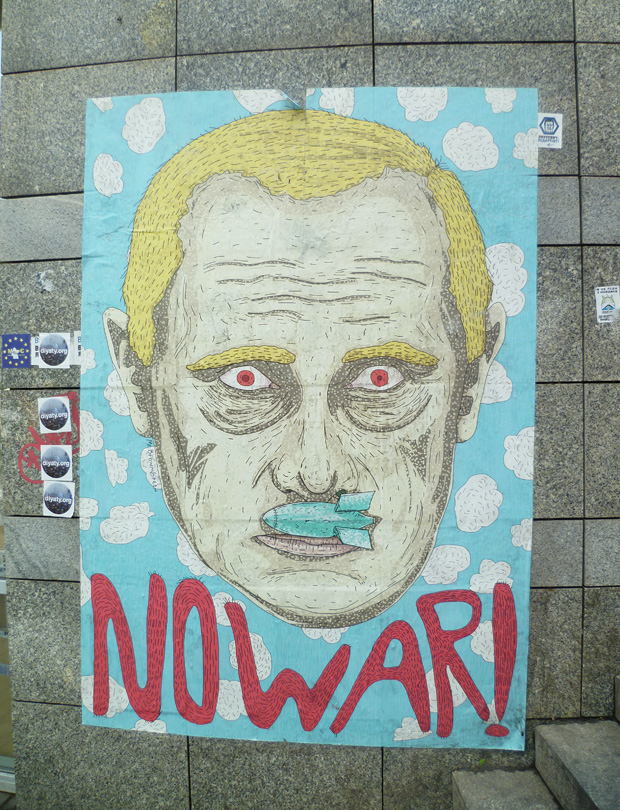
(Image: Milana Knezevic/Index on Censorship)
Bernard-Henri Lévy spoke of his recent visits to eastern Ukraine, explaining that while they might be fewer than in the Maidan, there are people in these areas who support a unified Ukraine. He contested what he believed to be the image presented in western media that people in the east are all separatists. While the point was made that flags, national symbols and the Maidan movement is not perceived as positively in all parts of the country as in Kiev, Constantin Sigov, professor at the National University of Kyiv-Mohyla, argued that the Ukrainian crisis is first and foremost civil and political, not one of identity.
Russia’s foreign policy and Russian President Vladimir Putin were unsurprisingly recurring themes. “He has values. They are not our values, but they are values,” said François Heisbourg, chairman of the International Institute for Strategic Studies, talking on the panel of geopolitics after Crimea. Writer Paul Berman argued, in the same panel, that Putin is acting from a position of weakness, and fear that Russia is not stable. Others, meanwhile, were uncomfortable with the term geopolitics, saying it legitimises Putin’s world view.
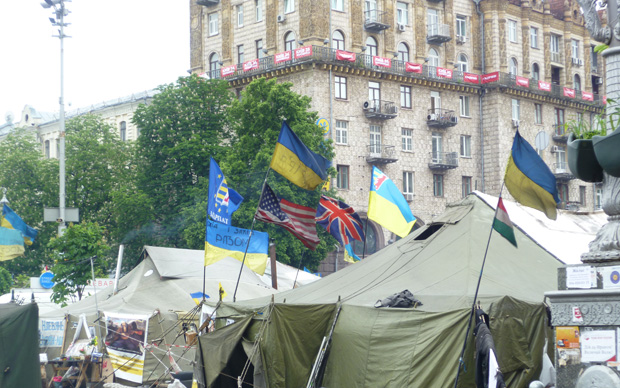
(Photo: Milana Knezevic/Index on Censorship)
Russia’s propaganda strategy was also a hot topic and elicited strong responses, with one audience member referring to it as a weapon of mass destruction. “Propaganda is the beginning of bloodshed, it precedes bloodshed,” said Alexandr Podrabinek, editor-in-chief of Prima information agency, on the panel discussing whether rights make us human. State-run news channel RT, formerly Russia Today, got several mentions. Academic Anton Shekhovtsov argued that RT gives space to democratic consensus in its coverage, but also to left-wing, far right and libertarian narratives, and even conspiracy theories. Because each is treated in roughly the same way, the democratic narrative becomes just one of many. He said this explains why RT appeals to some people in the west, but stressed that they’re pushing an overall Russian agenda.
Podrabinek, despite dubbing RT “hateful”, argued that while there might be a temptation to shut down views we don’t like, this is not a good way of confronting them. If we want freedom of expression, he said, we can’t do that. On a related note, Carl Gersham argued that while Ukraine needs to be supported economically and militarily, they also need support in modernising the media landscape, to foster internal dialogue.
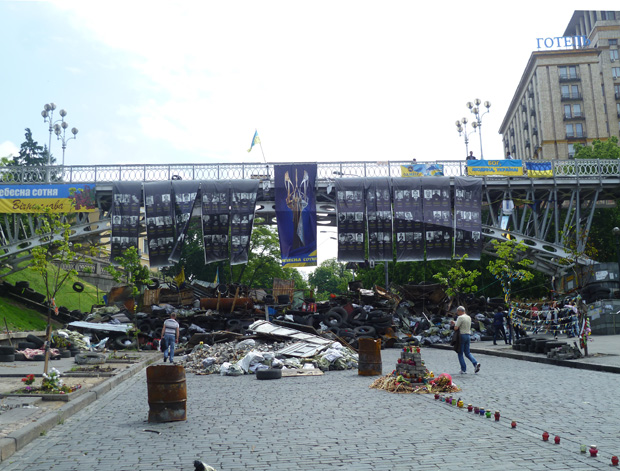
(Photo: Milana Knezevic/Index on Censorship)
And while the regime was criticised by speaker after speaker, ordinary Russians and their rights were not forgotten. Sergei Lukashevsky, director of the Sakharov Museum and Public Centre, put the support for Putin into the context of fear. When people see that the state is cracking down on human rights again, he argued, they make themselves fit in — go into survival-mode. While rights exist formally in Russia, he explained the practical situation through an old Soviet joke: “Do I have the right? Yes. Can I? No.”
In a weekend of intellectuals discussing how to solve a crisis, novelist and non-fiction writer Slavenka Drakulic gave a sobering lecture on the role of intellectuals in causing crises, specifically the Balkan wars. To be able wage war, to kill, you have to create an enemy and dehumanise it, she argued. Here is where academics, poets, journalists came in handy in former Yugoslavia — by preparing people psychologically for conflict, “using words almost like bullets”.
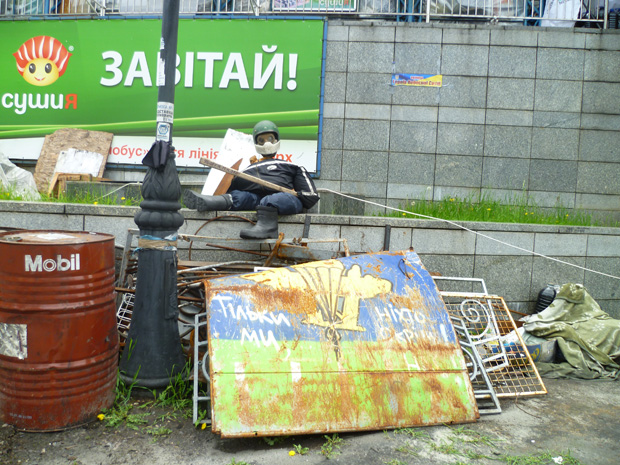
(Photo: Milana Knezevic/Index on Censorship)
And this leads well into the final panel of the conference, on the role of history and memory in politics, the difference between official history and collective and personal memories of the people, and how especially the former can be manipulated. We’re arguably seeing that today already, with Timothy Snyder saying that with events in Ukraine, a European revolution is being contested even as it’s happening. The Russian Ministry of Education is already writing new chapter to explain Crimea, said acclaimed Ukrainian novelist Andrey Kurkov. “And Ukraine might have their version.”
After my trip to Maidan, I asked a Ukraine-based AP journalist what the future might bring for the square. There are only a specific type of people still there, she explained, and they might see how the elections go before they decide to stay or leave.
Or as Myroslav Marynovych, the founder of Amnesty International Ukraine, said during the conference — when there is democracy, there will be no need to go to Maidan.
This article was published on May 22, 2014 at indexoncensorship.org
8 May 2014 | Europe and Central Asia, News

Eurovision contestant Teo, in the music video for this year’s Belarusian entry Cheesecake (Image: Yury Dobrov/YouTube)
If you want a Eurovision of the future, imagine a faux-dubstep bassline dropping on a human falsetto, forever. That was how it felt watching YouTube footage of this year’s entrants in the continent’s greatest song-and-dance-spectacle.
The Eurovision Song Contest, born of the same hope for the future and fear of the past as the European Union, is approaching its 50th year. And strangely, it’s doing quite well. In spite of fears that the competition would end up as an annual carve up between former Soviet states, recent years have in fact seen a fairly equal spread of winners throughout the member states of the European Broadcasting Union (who do not actually have to be in Europe; a fact often missed by anti-Zionists who somehow see a conspiracy in the fact that Israel is a regular entrant in the competition is that channels in countries such as Libya, Jordan and Morocco are also members of the EBU, and technically could enter if they wish. Morocco did, in 1980). Since 2000, the spread of winners between Western Europe, the former Soviet states, and the Balkans and Turkey have been pretty much even.
While some of the geopolitics will always be with us — Turkey and Azerbaijan united in their hatred of Armenia, Cyprus and Greece douze-pointsing each other at every opportunity — the once-derided contest has in fact functioned as a genuine competition. Year in, year out, the best song in the competition tends to win, while the laziest entrants, not taking the event seriously as a songwriting competition (yes, we’re looking at you, Britain), tend to fall behind and then complain that Europe doesn’t “get” pop music.
The best songs and singers triumph, by and large. But Eurovision still does have a political edge.
Take Tuesday’s semi-final in Copenhagen. Russia’s entry, Shine, performed by the Tolmachevy Sisters and described by Popbitch as sounding like “almost every Eurovision song you’ve ever imagined” contained some unintentionally ominous lines:
Living on the edge / closer to the crime / cross the line a step at a time
Add an “a” to the end of that “crime”, and you’ve got the Kremlin’s current foreign policy neatly summed up in a single stanza.
I am not suggesting that the Tolmachevys were sent out to justify Putin’s expansionism. Nonetheless, the Copenhagen crowd were keen that Russia should know what the world thought of its foreign policy and domestic human rights record: as it was announced that Russia had made Saturday’s grand final, the arena erupted in jeering. The dedicated Eurovision fan is clearly not just a poppet living in a fantasy world of camp. They are engaged with the world, and particularly the regressive policies of countries such as Russia, Azerbaijan and Belarus, perhaps more so than your average European.
When Sweden’s Loreen won the competition in Baku, capital of Azerbaijan, in 2012, she pledged to meet the country’s human rights activists. That same year, BBC commentator “Doctor Eurovision” (he actually is a doctor of Eurovision) made explicit references to Belarus’s disgraceful dictatorship, rather than simply giggle at the funny eastern Europeans.
This raises an interesting question about how we engage with dubious regimes.
Before the Baku Eurovision in 2012, there was some discussion over whether democratic countries should boycott the competition, sending a message to Aliyev’s regime.
“No,” Azerbaijani civil rights activists told Index on Censorship. “Let the world come and see Azerbaijan.” They felt that for most of the world, most of the time, they are citizens of a far away country of whom we know nothing. They wanted to take their chance while the world was looking. I think they got it right. As discussed last week, Azerbaijan is engaged in a massive international PR campaign, but to most people in the world since that Eurovision and the attention it raised for the country’s opposition, it has not been able to entirely disguise its atrocious record on free speech and other rights.
On Friday, the International Ice Hockey Federation’s world championship will open in Belarus. Though there was some discussion of boycotting that event, it has died down. Nonetheless, journalists from Europe and North America will be covering the event, and fans will travel too.
Belarus’s macho dictator Alexander Lukashenko is a keen ice hockey fan, and will be aiming to sweep up the glory of hosting a major international sporting event, not long after the country hosted the world track cycling championships in 2013.
Ice hockey fans and sports journalists are generally not the type of people who go in for Eurovision. But maybe they should try to take a leaf out of the Song Contest supporters book. Have a look at the country around them, learn a little about the politics, and spread the word about the side the dictators don’t want us to see.
Autocrats try to use these international competitions to control the world’s view of them. We should beat them at their own games.
This article was posted on May 8, 2014 at indexoncensorship.org
2 May 2014 | News
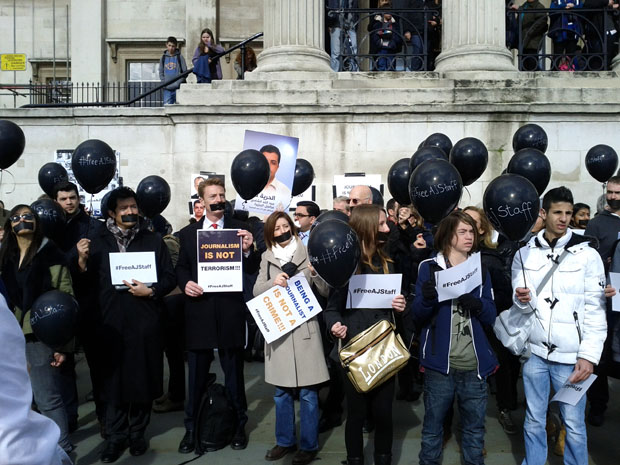
A London protest calling for the release of jailed Al Jazeera journalists in Egypt (Image: Index on Censorship)
Press freedom is at a decade low. Considering just a handful of the events of the past year — from Russian crackdowns on independent media and imprisoned journalists in Egypt, to press in Ukraine being attacked with impunity and government reactions to reporting on mass surveillance in the UK — it is not surprising that Freedom House have come to this conclusion in the latest edition of their annual press freedom report. This serves as a stark reminder that press freedom is a right we need to work continuously and tirelessly to promote, uphold and protect — both to ensure the safety of journalists and to safeguard our collective right to information and ability to hold those in power to account. On the eve of World Press Freedom day, we look back at some of the threats faced by the world’s press in the last 12 months.
1) Journalism is not terrorism…
National security has been used as an excuse to crack down on the press this year. “Freedom of information is too often sacrificed to an overly broad and abusive interpretation of national security needs, marking a disturbing retreat from democratic practices,” say Reporters Without Borders (RSF) in their recently released 2014 Press Freedom Index.
Journalists have faced terrorism and national security-related accusations in places known for their somewhat chequered relationship with press freedom, including Ethiopia and Egypt. However, the US and the UK, which have long prided themselves on respecting and protecting civil liberties, have also come under criticism for using such tactics — especially in connection to the ongoing revelations of government-sponsored mass surveillance.
American authorities have gone after former NSA contractor and whistleblower Edward Snowden, tapped the phones of Associated Press staff, and demanded that journalists, like James Risen, reveal their sources. British authorities, meanwhile, detained David Miranda under the country’s Terrorism Act. Miranda is the partner of Glenn Greenwald, the journalist who broke the mass surveillance story. Authorities also raided the offices of the Guardian — a paper heavily involved in reporting in the Snowden leaks.
2) …but governments still like putting journalists in prison
The Al Jazeera journalists detained in Egypt on terrorism-related charges was one of the biggest stories on attacks on press freedom this year. However, Mohamed Fahmy, Baher Mohamed, Peter Greste and their colleagues are far from the only journalists who will spend World Press Freedom Day behind bars. The latest prison census from the Committee to Protect Journalists (CPJ) put the number of journalists in jail for doing their job at 211 — their second highest figure on record.
In Bahrain, award-winning photographer Ahmed Humaidan was sentenced in March to ten years in prison. In Uzebekistan, Muhammad Bekjanov, editor of opposition paper Erk, is serving a 19-year sentence — which was increased from 15 in 2012, just as he was due to be released. In Turkey, after waiting seven years, Fusün Erdoğan, former general manager of radio station Özgür Radyo, was last November sentenced to life in jail. Just last Friday, Ethiopian authorities arrested prominent political journalist Tesfalem Waldyes and six bloggers and activists.
3) New media is under attack…
As more journalism is being conducted online, blogs, social and other new media are increasingly being targeted in the suppression of press freedom. Almost half of the world’s jailed journalists work for online outlets, according to the CPJ. China — with its massive censorship apparatus — has continued censoring microblogging site Sina Weibo, while also turning its attention to relative newcomer WeChat. In March, it closed down several popular accounts, including that of investigative journalist Luo Changping.
Meanwhile, Turkish Prime Minister Recep Tayyip Erdoğan has publicly all but declared war on social media, at one point calling it the “worst menace to society”. Twitter played a big role in last summer’s Gezi Park protests, used by journalists and other protesters alike. Only days ago, Turkish journalist Önder Aytaç was jailed, essentially, because of the letter “k” in a Tweet.
Meanwhile Russia has seen a big crackdown on online news outlets, while legislation recently passed in the Duma is targeting blogs and social media.
4) …and independent media continues to struggle
Only one in seven people in the world live in countries with free press. In many parts of the world, mainstream media is either under tight control by the government itself or headed up media moguls with links to those in power, with dissenting voices within news organisation often being pushed out. Brazil, for instance, has been labelled “the country of 30 Berlusconis” because regional media is “weakened by their subordination to the centres of power in the country’s individual states”. At the start of the year, RIA Novosti — known for on occasion challenging Russian authorities — was liquidated and replaced by the more Kremlin-friendly Rossiya Segodnya (Russia Today), while in Montenegro, has seen efforts by the government to cut funding to critical media. This is not even mentioning countries like North Korea and Uzbekistan, languishing near the bottom of press freedom ratings, where independent journalism is all but non-existent.
5) Attacks on journalists often go unpunished
A staggering fact about the attacks on journalists around the world, is how many happen with impunity. Since 1992, 600 journalists have been killed. Most of the perpetrators of those crimes have not been brought to justice. Attacks can be orchestrated by authorities or by non-state actors, but the lack of adequate responses by those in power “fuels the cycle of violence against news providers,” says RSF. In Mexico, a country notorious for violence against the press, three journalists were murdered in 2013. By last October, the state public prosecutor’s office had yet to announce any progress in the cases of Daniel Martínez Bazaldúa, Mario Ricardo Chávez Jorge and Alberto López Bello, or disclose whether they are linked to their work. Pakistan is also an increasingly dangerous place to work as a journalist. Twenty seven of the 28 journalists killed in the past 11 years in connection with their work have been killed with impunity. Syria, with its ongoing, devastating war, is the deadliest place in the world to be a journalist, while some of the attacks on press during the conflict in Ukraine, have also taken place without perpetrators being held accountable. That attacks in the country appear to be accelerating, CPJ say is “a direct result of the impunity with which previous attacks have taken place”.
This article was published on May 2, 2014 at indexoncensorship.org








